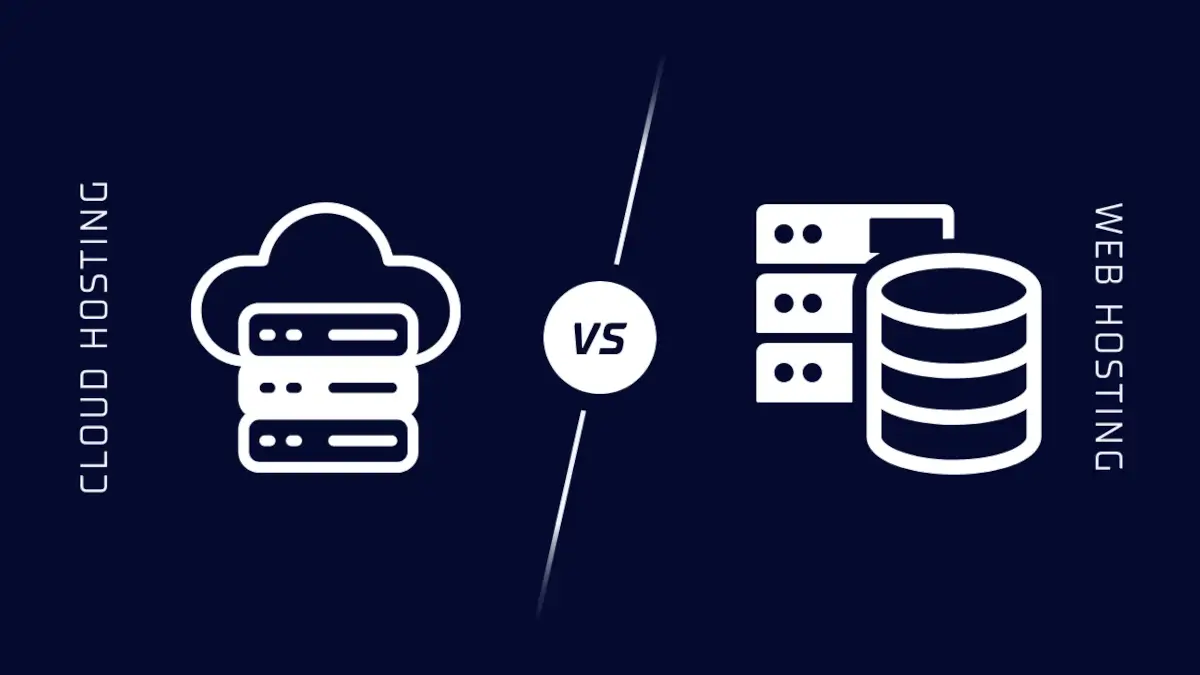When you’re building a website, one of the most important decisions you’ll make is choosing the right type of hosting. Two of the most common options are cloud hosting and traditional web hosting (shared, VPS, or dedicated hosting).
While both serve the same purpose — keeping your website online — they work in very different ways.

In this article, I’ll explain cloud hosting vs web hosting in detail; also compare their features, performance, costs, pros and cons, and help you decide which one is best for your website. So let’s get started.
What is Web Hosting?
Web hosting refers to a service where your website files, databases, and applications are stored on a physical server that is connected to the internet.
There are several types of web hosting:
- Shared Hosting – Multiple websites share the same server resources (CPU, RAM, storage). It’s the cheapest option but has limited performance.
- VPS Hosting (Virtual Private Server) – A physical server is divided into virtual compartments, giving you dedicated resources but still sharing the physical machine.
- Dedicated Hosting – A single server is fully dedicated to your website. It provides maximum performance but comes at a high cost.
In traditional web hosting, your site’s performance depends on one physical server. If the server goes down, your website also goes offline.
What is Cloud Hosting?
Cloud hosting uses a network of interconnected virtual servers (the cloud) to host your website. Instead of relying on a single physical server, your site runs on a cluster of servers that share resources.
This setup ensures high availability, flexibility, and scalability because resources can be scaled up or down instantly depending on your needs.
In cloud hosting, if one server fails, another one takes over automatically, keeping your website online 24 by 7 without any downtime.
Key Differences: Cloud Hosting vs Web Hosting.
Here’s a side-by-side comparison of cloud hosting and web hosting:
| Feature | Web Hosting | Cloud Hosting |
|---|---|---|
| Infrastructure | Hosted on a single physical server | Hosted on multiple interconnected servers (cloud) |
| Performance | Limited to server resources | High performance with scalable resources |
| Scalability | Hard to scale quickly | Instantly scalable up or down |
| Reliability | If server fails, site goes down | Failover protection ensures uptime |
| Cost | Usually cheaper (fixed monthly fee) | Pay-as-you-go, based on usage |
| Flexibility | Less flexible, limited resource allocation | Highly flexible, customizable |
| Security | Basic security, depends on hosting plan | Advanced security with data redundancy |
| Best For | Small websites, blogs, portfolios | Growing businesses, eCommerce, high-traffic sites |
Pros and Cons of Web Hosting.
Advantages:
- Affordable and beginner-friendly
- Easy to set up and manage
- Good for small websites, personal blogs, and portfolios
Disadvantages:
- Limited performance and scalability
- Downtime risk if the server fails
- Resource sharing can slow down your site
Pros and Cons of Cloud Hosting.
Advantages.
- High uptime and reliability
- Instantly scalable resources
- Pay-as-you-go pricing saves money if managed well
- Excellent for handling sudden traffic spikes
Disadvantages.
- More expensive than shared hosting
- Requires some technical knowledge for configuration
- Cost can rise quickly with heavy usage
Which One Should You Choose?
Your choice between cloud hosting vs web hosting depends on your website needs:
- Choose Web Hosting if:
- You’re just starting out with a blog, portfolio, or small business website.
- You don’t expect heavy traffic.
- You want a budget-friendly hosting solution.
- Choose Cloud Hosting if:
- You run an eCommerce store, SaaS platform, or large business site.
- You expect fluctuating or high traffic.
- You want better uptime, speed, and flexibility.
Cloud Hosting vs Web Hosting: Which is Better for SEO?
- Web Hosting: If your site slows down due to resource sharing, it can negatively impact SEO.
- Cloud Hosting: Provides faster load times, better uptime, and handles traffic spikes — all of which are SEO-friendly.
If SEO and speed are critical for your business, cloud hosting has the edge.
Cost Comparison: Cloud Hosting vs Web Hosting.
- Shared Hosting: $2 – $10/month
- VPS Hosting: $20 – $80/month
- Dedicated Hosting: $80 – $300+/month
- Cloud Hosting: $10 – $200+ per month (pay-per-use basis)
While cloud hosting may seem more expensive upfront, its scalability often makes it more cost-effective for growing websites.
Final Thoughts.
When comparing cloud hosting vs web hosting, there’s no one-size-fits-all answer.
- Web Hosting is perfect for beginners and small websites that need a simple, affordable solution.
- Cloud Hosting is ideal for businesses, eCommerce, and websites that demand high uptime, speed, and scalability.
The best choice depends on your budget, traffic expectations, and business goals.
Leave a Reply